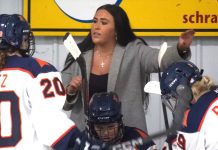Massachusetts-Lowell was dealt a major blow Friday night when it was discovered that sophomore forward Paul Falco, a transfer from Maine, was not eligible to play when he began his tenure on the ice for Lowell about a month ago. As a result, the River Hawks are forced to forfeit nine games, five of which they won — including three Hockey East contests — between December 27, 2003 and January 24, 2004, for using an ineligible player.
Though a player was not named in a press release issued by UML’s Department of Athletics, nor would athletic director Dana Skinner name the player in an interview on Friday, it is easily inferred that Falco, who transferred to Lowell in the spring of 2003 and played his first game on Dec. 27, was the player who was not eligible to compete with the River Hawks. Only two players transferred in and began play with Lowell after the holidays — Falco, who played nine games, and goaltender John Yaros, who played just his fourth game for the River Hawks Friday night against Boston University.
A transfer player is required to sit a minimum of one academic year at the new school when transferring between Division I institutions. During that year, he must complete at least 24 credits, but according to the school, the player in question only completed 22, two shy of the minimum. That would have made him ineligible to compete this past December.
According to the release, the issue was discovered by Skinner himself, who immediately reported the violation to the NCAA this past Tuesday. Skinner did not announce the forfeits or tell the team until after the club’s game against BU on Friday night.
“I take full responsibility for this,” said Skinner. “This is not the player’s fault, not the coaches fault. It’s entirely my fault.
“The fact that current members of the hockey team must suffer for an administrative error is something that causes me great anguish. It was a mistake we have never made previously.”
Falco’s first play as a River Hawk came on December 27, 2003, at the Badger Hockey Showdown in Wisconsin against Ferris State. The River Hawks lost that night, 7-4, but captured their first win with Falco in the lineup the next night, beating Union 5-3 in the consolation game. Falco scored a goal in that game, his only point in the nine games he played with the River Hawks this season.
Falco also suited up for two wins over Massachusetts, a split weekend at Michigan State, a split weekend against Merrimack and a loss against Brown. The wins against Union, Merrimack, Michigan State and the two against Massachusetts all will be reversed, though all individual statistics from those games will stand according to NCAA bylaw 31.10.5.4.
Skinner noted that the error was picked up this past week during a routine compliance review that, according to him, is performed “often.”
“It was sloppily handled,” said Skinner, referring to the fact that the ineligibility was overlooked for so long. “Five different things had to go wrong for this kid to fall through the cracks.”
Skinner also noted that the department is taking steps to “shore up the compliance review process.”
Lowell’s record now drastically changes from 13-11-3 overall and 8-4-1 in Hockey East to 8-16-3 overall, 5-7-1 in Hockey East.
According to NCAA bylaws, the forfeited games count only towards a school’s NCAA record (i.e., the record used to determine seeding for the NCAA tournament). The NCAA has no sanction over what will happen with the Hockey East standings. The league has two options: keep the league standings as is, or change the three Lowell wins to losses, and their opponents’ losses to wins.
According to Skinner, the league will choose the latter, which has a major impact on the standings. Massachusetts gains four points and jumps to second place in the league, Merrimack picks up two points and is bumped up to a tie for fifth, and Lowell loses six points and descends into a tie for fifth place. Also, there is now a huge six-point gap between fourth and fifth place, with the league’s top four teams gaining home ice for the first round of the postseason tournament.
Falco arrived at Lowell after being dismissed from Maine in June of 2002 for an arrest related to the selling of drugs to an undercover police officer. Maine head coach Tim Whitehead told the Patriot Ledger (Quincy, Mass.) at the time, “I was very surprised and disappointed to learn of the charges against Paul. I want to emphatically state that there is no room in our program for the type of activity of which he is accused.”
There was no word on what the future will hold for Falco now as a member of the River Hawks, though Skinner consistently emphasized that no blame can be placed on the athlete as this was completely an administrative error.
Lowell’s athletic program under the direction of Dana Skinner has been extremely well thought of in the NCAA community. Skinner, in fact, was named Northeast Region Athletic Director of the Year a season ago by the National Association of Collegiate Directors of Athletics.
Skinner took over the program in 1995 after Dr. Wayne Edwards left the school to become director of athletics at Towson State. In the late 1980s and early 1990s, the Lowell program, then under Edwards’ watch, was investigated by the NCAA with infractions found, leading to long-time hockey coach Bill Riley being reassigned within the athletic department.
The forfeits for Lowell are the first imposed upon a Hockey East school since Maine, then coached by the late Shawn Walsh, was forced to forfeit much of its season for using ineligible players in 1993-94. That discovery led to a full-blown investigation into the Maine athletics program, which at the time was the defending NCAA hockey champion, and resulted ultimately in Walsh being suspended by the school for an entire season in 1996.
Lowell was a 2-1 winner against Boston University on Friday and will continue Hockey East play at Providence on Saturday night.


